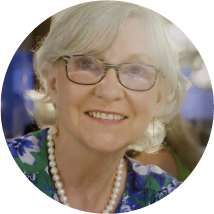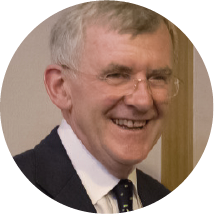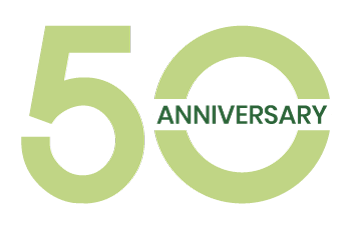At the invitation of the ADEE Board Majella Giles (ADEE's first full team staff member) sat down with Prof Derry Shanley (ADEE President 1996-1997) to reflect on ADEE and some of its achievements to mark the 50th Anniversary of ADEE.


I think it has to be the peer-review visitations to dental schools throughout Europe initially, and expanded internationally thereafter. From its inception in 1975 ADEE has maintained and followed its objectives in the field of dental education, it has been a lobbyist, a communications hub and an academic network for its membership, pursuing cooperative initiatives with sister associations in other continents in the advancement of dental education and oral health.
The European Economic Community (EEC) Dental Directives concerning the mutual recognition of diplomas, certificates and other evidence of the formal qualifications of practitioners of dentistry, were published in 1978. They contain institutional acts of the formation of the Advisory Committee for the Training of Dental Practitioners (ACTDP), which had a great influence on the development of dentistry in Europe. ADEE collaborated with ACTDP directly through members of the Association, who were simultaneously members of the Advisory Committee. Some of the significant actions of the ACTDP have been inspired in part by the activities of ADEE.
ADEE recognised that educational approaches differed between European countries, with some using the stomatology model and others the odontology model. A Pan-European approach required generous concessions and a nuanced approach to ensure any changes were patient-orientated and considered socio-economic demographics whilst at the same time, satisfying the national dental educational requirements of individual EU member states.
ADEE was particularly active in the sector of harmonisation of programmes in the EU and development of relations with countries of Eastern Europe. In 1996 an ADEE delegation (Prof. Mariano Sanz (ES), Prof. Peter Gaengler (DE), Dr. Hans Groenveld (NL), Prof. Madeleine Rohlin (SE), Prof. Antonio Carrassi (IT) and Chairperson and ADEE President, Prof Derry Shanley (IE) ) was invited to visit the University of Minsk in Belarus. The brief of the visitors was to identify strengths and weaknesses and make recommendations. ADEE accepted the invitation with the idea of testing a visitation procedure and establishing a visit protocol for the future. This was the beginning of the process of harmonisation in dental education.
In 1998 the EU Directorate for Education and Culture DG XXII awarded approval and funded DentEd, the self-assessment and peer review school visitation initiative which was based on the format already established by ADEE, to undertake a series of self-assessments by dental schools followed by peer review visits undertaken by a team of their peers, drawn from other dental schools in Europe. Impressed by the first phase of DentEd, which conducted 29 peer-review school visits and submitted its final reports to the EU in the year 2000, the Commission encouraged closer collaboration with other continents especially North America and Africa. A proposal submitted for a second phase entitled DentEdEvolves, was given EU approval and funding. Evolving from engagement with other continents, ADEE/DentEd collaborated with the American Dental Education Association (ADEA) and International Federation of Dental Education Associations(IFDEA) in the USA to convene the 1st Global Congress in Dental Education held in Prague in 2001 and a second Global Congress in Singapore in 2002, in conjunction with the South East Asia Association for Dental Education (SEAADE).
In these congresses, issues of governance, management, human resources, and financial sustainability had become increasingly relevant to all universities struggling with diminishing state support. Research is the lifeblood of a university and the balance with the scholarship of education in the promotion of learning was a matter of competing priorities and resources.
Over the six-year span of DentEd, and its successor DentEdEvolves, self- assessments and peer review visits were completed in 60 dental/stomatological institutions involving over 100 visitors from 29 countries, 1,500 faculty members, with participation from up to 10,000 students in school visits and interviews. On completion of DentEdEvolves, the EU commission indicated it was positively disposed to a further three-year project. Responsibility for the third phase DentEd III, which merged DentEd into ADEE and facilitated the establishment of ADEE’s headquarters in Dublin, was undertaken by Prof. Alfons Plasschaert (NL) and Dr. Jacinta McLoughlin (IE).
DentEd III concentrated on forging formal ADEE support for a growing consensus with ADEE and DentEd on defined competences, discussed in the final DentEdEvolves plenary session in Dresden in 2003. DentEd and DentEdEvolves focused on establishing a global network of dental educators, gaining understanding and mutual respect for regional differences and open debate on fundamental issues in dental education.
The DentEd approach in its first six years sought to avoid imposing a particular set of goals and outcomes but rather promoted working groups, with exchanges, findings, suggestions and recommendations. The peer influence however was sufficient to prepare for DentEd III 2004-2007, which began the process of formal publication of a consensus on clinical competence, a more specific profile of the European dentist and appropriate methods of assessment, under the umbrella of a merged DentEd / ADEE.


My outstanding memory, amongst many key moments both convivial and ground-breaking, comes from 2001 as I watched the delegates assemble for the first Global Congress on Dental Education in Prague, where so many colleagues gathered from 160 dental schools in 47 countries to give their time and energy to pool their knowledge and intellectual resources for the betterment of their future colleagues in and of the communities they serve.


The peer led school visitations programme, whilst aimed at harmonising standards across Europe in the advancement of education and training for the promotion of the highest level of oral healthcare was a learning exercise for both visitors and schools alike. Visitors were able to appreciate the constraints under which schools in less affluent countries operated: a humbling experience. The success of the visitations programme is enabled in the collaborative approach whereby both visitor and visited gain from the process. It is my fervent hope that this approach is maintained in the collegiate way in which it was initially envisioned. The evidence as to the success of such an approach on the raising of standards globally, based on evidence informed consensus policy documents is compelling.
In facilitating the exchange of ideas the establishment of the ADEE peer-reviewed international Scientific Journal in 1996, in an agreement with the prestigious scientific publisher Munksgaard, was signed by ADEE Past President Prof. Erik Hjørting-Hansen (DK) and ADEE Editor Prof. John Scott (UK) on behalf of ADEE. A peer-reviewed publication is essential for dissemination of current science, but undoubtedly, some of ADEE’s success is due to the return of face-to-face meetings, which contribute to richer discussions and outcomes. I would be an advocate of this approach.
In the current geo-political turmoil of 2025, the term global has assumed a different meaning, with national interests coming to the fore. Such self-interests run counter to the ethos fostered by ADEE and its inclusive approach, promoting diversity, difference, collegiality and mutual cooperation.


(Congratulations ADEE and continued success in the coming years!)

Derry Shanley & Majella Giles
Dublin, April 2025






